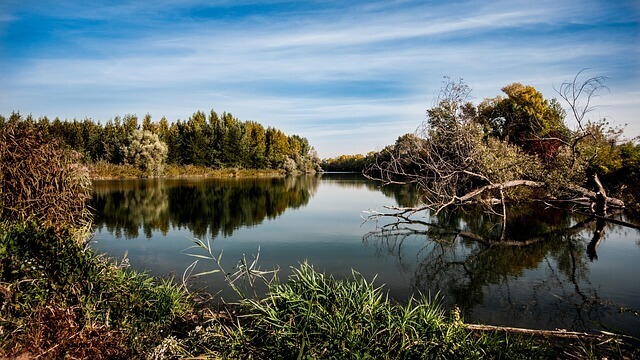
Various Inter-State Water Disputes Tribunals have been constituted so far, but it had its own problems. In this article, we analyze whether it’s time for a new mechanism.
Water in the Constitution of India
Water is a State subject as per entry 17 of the State List, and thus states are empowered to enact legislation on water.
- Entry 17 of the State List deals with water i.e. water supply, irrigation, canal, drainage, embankments, water storage and water power.
- Entry 56 of the Union List gives power to the Union Government for the regulation and development of inter-state rivers and river valleys to the extent declared by Parliament to be expedient in the public interest.
Article 262 of the Indian Constitution:
Constituent Assembly anticipated the emergence of water disputes in future. A specific provision of Article 262 is mentioned in the constitution itself due to the sensitivity of such disputes.
In the case of disputes relating to waters, Article 262 provides:
- Parliament may by law provide for the adjudication of any dispute or complaint with respect to the use, distribution or control of the waters of, or in, any inter-State river or river valley.
- Notwithstanding anything in this Constitution, Parliament may, by law provide that neither the Supreme Court nor any other court shall exercise jurisdiction in respect of any such dispute or complaint.
Parliament has enacted two laws according to Article 262:
1) River Board Act, 1956
The purpose of this Act was to enable the Union Government to create Boards for Interstate Rivers and river valleys in consultation with State Governments. The objective of Boards is to advise on the inter-state basin to prepare development schemes and to prevent the emergence of conflicts.
Note: Till date, no river board as per the above Act has been created.
2) Inter-State Water Dispute Act, 1956
Provisions of the Act: In case, if a particular state or states approach to Union Government for the constitution of the tribunal:
- Central Government should try to resolve the matter by consultation among the aggrieved states.
- In case, if it does not work, then it may constitute the tribunal.
Note: Supreme Court shall not question the Award or formula given by tribunal but it can question the working of the tribunal.
The composition of the River Water Tribunal: Tribunal is constituted by the Chief Justice of India and it consists of the sitting judge of Supreme Court and the other two judges who can be from Supreme Court or High Court.
The Present Mechanism to resolve the inter-state river water disputes in India
Thus it can be seen that – the resolution of water dispute is governed by the Inter-State Water Disputes Act, 1956. According to its provisions, a state government can approach the Centre to refer the dispute to a tribunal, whose decision is considered final.
Active River Water sharing Tribunals in India
- Krishna Water Disputes Tribunal II (2004) – Karnataka, Telengana,Andra Pradesh, Maharashtra
- Mahanadi Water Disputes Tribunal (2018) – Odisha& Chattisgarh
- Mahadayi Water Disputes Tribunal (2010)- Goa,Karnataka, Maharashtra
- Ravi& Beas Water Tribunal (1986)- Punjab, Haryana,Rajasthan
- Vansdhara Water Disputes Tribunal (2010)- Andra Pradesh & Odisha.
Inter-State river water disputes under the Inter-State River Water Disputes Act (ISRWD), 1956
River(s) |
States |
Krishna |
Maharashtra, Andhra Pradesh, Karnataka |
Godavari |
Maharashtra, Andhra Pradesh, Karnataka, Madhya Pradesh and Odisha |
Narmada |
Rajasthan, Madhya Pradesh, Gujarat, Maharashtra |
Cauvery |
Kerala, Karnataka, Tamil Nadu and Union Territory of Pondicherry |
Krishna |
Karnataka, Andhra Pradesh, and Maharashtra |
Model/ Mandovi/Mahadayi/ |
Goa, Karnataka and Mahasrashtra |
Vansadhara |
Andhra Pradesh & Odisha |
Note: You can check the verdicts and latest status of each of these river water tribunals in this link.
Inter-State Water Dispute Act, 1956: Extra Ordinary Delays in the execution and implementation
- Many times there have been extraordinary delays in constituting the tribunal. For example, in the case of Godavari water dispute, the request was made in 1962. The tribunal was constituted in 1968 and the award was given in 1979 which was published in the Gazette in 1980.
- Similarly, in Cauvery Water Dispute, Tamil Nadu Government requested to constitute the tribunal in 1970. Only after the intervention of Supreme Court, the tribunal was constituted in 1990.
- Due to delay in constituting the tribunal, state governments continued to invest resources in the construction and modification of dams, thus strengthening their claims.
Solution: Amendments to the Act in 2002
- In 2002, an Amendment was made in the Act by which the tribunal has to be constituted within a year of getting the request.
- It has also been mandated that the tribunal should give the award within 3 years. In certain situations, two more years can be given. Thus the maximum time period was 5 years within which the tribunal should give the award.
- Tribunal award is not immediately implemented. Concerned parties may seek clarification within 3 months of the award.
- It has also been clarified that the Tribunal Awards will have the same force as the order or decree of Supreme Court. The award is final and beyond the jurisdiction of Supreme Court.
But still, there were issues…
- Though Award is final and beyond the jurisdiction of Courts, either States approach Supreme Court under Article 136 (Special Leave Petition) or private persons approach Supreme Court under Article 32 linking issue with the violation of Article 21 (Right to Life).
- The composition of the tribunal is not multidisciplinary and it consists of persons only from the judiciary. Thus there is not much difference in tribunal and Supreme Court Bench.
- Tribunals work gets delayed due to the lack of availability of the data.
New Solution: Inter-State Water Disputes (Amendment) Bill, 2017 – Dispute Resolution Committee and Single Permanent Tribunal

- The government has introduced this Bill in the present session of the Lok Sabha seeking to speed up the interstate water dispute resolution.
- The centre is to set up Dispute Resolution Committee having experts from the different fields in case of water disputes. The Committee will try to resolve the dispute within 1 year. The tribunal will be approached only when this committee fails to settle the dispute.
- According to this Bill, a Single Permanent Tribunal is to be set up which will have multiple benches.
- The Bill calls for the transparent data collection system at the national level for each river basin and a single agency to maintain data bank and information system.
The Case Studies of recent Inter-State River Water Disputes in the news
1) Cauvery Water Dispute
Cauvery is an inter‐State basin having its origin Karnataka and flowing through Tamil Nadu and Puducherry before out falling in the Bay of Bengal. The states concerned are Kerala, Karnataka, Tamil Nadu and Puducherry (UT).
- In 1892, there was an agreement between the princely state of Mysore and British province of Madras.
- In 1924, a new agreement for 50 years i.e. till 1974.
- In 1970, Tamil Nadu Government approached to Central Government to constitute the tribunal and also in the same year Tamil Nadu Farmers Association filed a civil suit in Supreme Court.
- In 1986, Tamil Nadu again made a formal request to constitute the tribunal.
- In 1990, the tribunal was set up on the directions of Supreme Court.
- The Cauvery Water Disputes Tribunal passed an Interim order in 1991 directing the State of Karnataka to release Water from its reservoirs in Karnataka so as to ensure 205 Thousand Million Cubic Feet (TMC) of water into Mettur reservoir of Tamil Nadu in a water year (1st June to 31st May) with monthly and weekly stipulations. Karnataka government refused to obey the interim award.
- After 16 years of hearing and an interim order, the Tribunal announced its final order in 2007 allocating 419 tmcft water to Tamil Nadu and 270 tmcft to Karnataka. Kerala was given 30 tmcft and Puducherry got 7 tmc ft. Both Karnataka and Tamil Nadu filed review petitions in Supreme Court.
- Karnataka has not accepted the order and refused to release the water to Tamil Nadu. In 2013, Contempt of Court was issued against Karnataka.
- In 2016, a petition was filed in Supreme Court to seeking the release of water by Karnataka as per the guidelines of the tribunal. When Supreme Court ordered Karnataka to release water, Kannada people protested the decision saying they do not have enough water.
- The matter is still sub judice (under judicial consideration).
2) Satluj Yamuna Link Canal Issue
- The issue links to the dispute between Punjab and Haryana after the formation of the Haryana in 1966. The parties involved are Punjab, Haryana, and Rajasthan.
- To enable Haryana to use its share of the waters of the Satluj and Beas, a canal linking the Satluj with the Yamuna was planned and in 1982 its construction was started.
- Due to the protest by Punjab, the tribunal was set up in 1986 which gave an award in 1987 recommending Punjab’s share as 5 Million Acre Feet (MAF) of water and Haryana’s as 3.83 MAF.
- Punjab contested the award and held that the tribunal overestimated the availability of the water. Haryana approached Supreme Court for the construction of the SYL canal in 2002. Supreme Court directed Punjab to complete the construction of canal within 12 months.
- In July 2004, Punjab Assembly passed Punjab Termination of Agreements Act scrapping water-sharing agreements with other states and thus jeopardising the construction of the canal. This Act has been declared unconstitutional by the Supreme Court in 2016 under President Advice (Article 143). In response, Punjab Assembly passed the Act according to which the land acquired for the canal would be denotified and returned to the original owners.
- Supreme Court has directed both Punjab and Haryana to maintain status quo in the Sutlej Yamuna Link canal controversy.
- In the recent hearing, Centre has offered as a mediator to both Punjab and Haryana.
Inter-State River Water Disputes: The Conclusion
India has 2.4% of the World’s land, 18% of the world population but only 4% of the renewable water resource. If sufficient steps are not taken, the uneven water distribution will increase the possibility of water conflicts.
Inter-state river water disputes hinder the cooperative federalism of our nation and provide parochial mindset making regional issues superior to national issues. One should realise that our nation is a family in which all states are its members.
So disputes must be resolved by dialogue and talks and the political opportunism must be avoided. The issue can be resolved by discussing the dispute in Inter-State Council which can be beneficial in providing a platform for the talks. Such disputes must be resolved as early as possible to ensure greater cooperation between the states.
Article by: Rahul Sharma, UPSC Topper 2016, With All India Rank 76






Thanks
Wise information
Thanks a lot.
Supper .Thanks a lot
excellent please provide more essays related to current issues useful for both upsc and ssc
Very concise and to the point. Thank you clearIAS.
Quite informativ
Superb.
Thank you !
thanks very good information